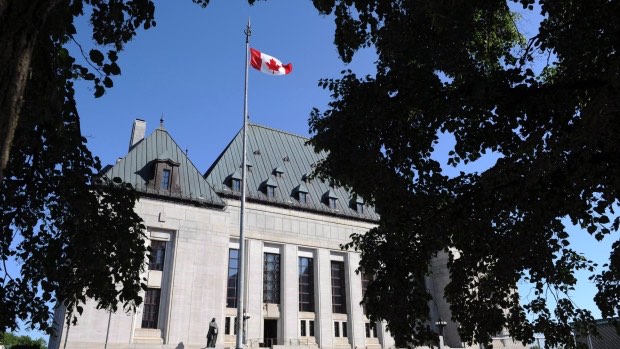It’s starting to feel like spring for many Canadians, but the country’s top court is about to wade into the issue of snow removal from wintry city streets.
The Supreme Court of Canada hearing Thursday could also help settle the question of when a public body such as a municipal government can be held liable for its decisions.
Taryn Joy Marchi alleged the City of Nelson, B.C., created a hazard when it cleared snow from downtown streets after a storm in early January 2015.
The removal effort left snow piles at the edge of the street along the sidewalk early in the morning of Jan. 5.
Late in the afternoon of March 6, Marchi parked in an angled spot on the street and, wearing running shoes with a good tread, tried to cross a snow pile to get on to the sidewalk.
Her right foot dropped through the snow and she fell forward, injuring her leg and winding up in hospital.
Marchi contended the city should have left openings in the snowbank to allow safe passage to the sidewalk.
She pointed to the neighbouring municipalities of Castlegar, Rossland and Penticton in arguing there were preferable ways to clear the streets so as to ensure safe access for pedestrians.
However, a judge dismissed her case, saying the city was immune from liability because it made legitimate policy decisions about snow clearing based on the availability of personnel and resources.
In any event, the judge concluded, Marchi assumed the risk of crossing the snow pile and was “the author of her own misfortune.”
The B.C. Court of Appeal overturned the decision and ordered a new trial, saying the judge erred in addressing the city’s duty of care and the question of Marchi’s negligence.
Certain decisions of the city’s street cleaning crew may properly have been characterized as “operational in nature” as opposed to policy decisions, the appeal court concluded.
The ruling prompted the City of Nelson to seek a hearing in the Supreme Court.
In a written submission to the high court, the city says its actions are “a clear example of a core policy decision” that should be immune from liability.
The city’s written and unwritten snow-removal policies plainly engage in a balancing of interests among competing parties, the submission says. “This is the core of a political decision — allocating scarce resources based on a good faith exercise of discretion.”
In her filing with the Supreme Court, Marchi says city employees made a number of operational decisions that fell below the expected standard of care of a municipality — decisions not required by the written policy.
“With respect to standard of care, the trial judge never properly addressed the reasonableness of the decision to create the hazard and leave it in place for 30 hours,” Marchi argues.
“Instead, the trial judge rested his analysis on the fact that the city had followed its policy.”
This report by The Canadian Press was first published March 24, 2021.
































